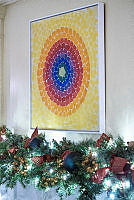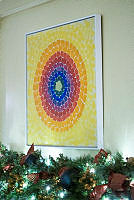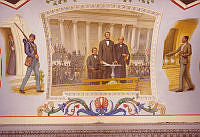Barack Obama

When Barack Obama was elected president in 2008, he became the first African American to hold the office. Obama faced major challenges during his two-term tenure in office. His primary policy achievements included health care reform, economic stimulus, banking reform and consumer protections, and a repeal of the “Don’t Ask, Don’t Tell” policy preventing lesbian and gay Americans from serving openly in the military.
Obama’s father, Barack Sr., a Kenyan economist, met his mother, Stanley Ann Dunham, when both were students in Hawaii, where Barack was born on August 4, 1961. They later divorced, and Barack’s mother married a man from Indonesia, where he spent his early childhood. Before fifth grade, he returned to Honolulu to live with his maternal grandparents and attend a private prep school on scholarship. In his memoir Dreams from My Father (1995), Obama describes the complexities of discovering his identity in adolescence.
After two years at Occidental College in Los Angeles, he transferred to Columbia University, where he studied political science and international relations. Following graduation in 1983, Obama worked in New York City, then became a community organizer on the South Side of Chicago, coordinating with churches to improve housing conditions and create job-training programs in a community hit hard by steel mill closures. In 1988, he went to Harvard Law School, where he attracted national attention as the first African American president of the Harvard Law Review. Returning to Chicago, he joined a small law firm specializing in civil rights.
In 1992, Obama married Michelle Robinson, a lawyer who had also excelled at Harvard Law. Their daughters, Malia and Sasha, were born in 1998 and 2001. Obama was elected to the Illinois Senate in 1996, and then to the U.S. Senate in 2004. At the Democratic National Convention that summer, he delivered an acclaimed keynote address. In 2008, after winning the Democratic nomination after a hard-fought primary race with Hillary Clinton, he defeated Arizona Senator John McCain by 365 to 173 electoral votes in the general election.
As an incoming president, Obama faced many challenges including the 2008 financial crisis, wars in Iraq and Afghanistan, and the continuing global war on terrorism. Inaugurated before an estimated crowd of 1.8 million people, Obama proposed unprecedented federal spending to revive the economy and a renewal of America’s stature in the world.
During his first term he signed three signature bills: economic stimulus, health care reform, and legislation reforming the nation’s financial institutions. Obama also pressed for a fair pay act for women and new safeguards for consumer protection. In 2009, Obama became the fourth president to receive the Nobel Peace Prize. However, in the 2010 mid-term elections, the Democrats lost control of the House of Representatives, thus affecting Obama’s future domestic policy agenda.
In 2012, he was reelected over former Massachusetts Governor Mitt Romney by 332 to 206 electoral votes. The Middle East remained a key foreign policy challenge. Obama directed the military and intelligence operation that led to the killing of Osama bin Laden, the head of Al-Qaeda and the terrorist responsible for the September 11, 2001 attacks on the United States. However, a new self-proclaimed Islamic State arose during a civil war in Syria and began inciting terrorist attacks. Obama sought to manage a hostile Iran with a treaty that hindered its development of nuclear weapons. The Obama administration also adopted the Paris Climate Agreement signed by 174 states and the European Union in 2015 to reduce greenhouse gas emissions and slow global warming.
In the last year of his second term, Obama spoke at two events that clearly moved him—the 50th anniversary of the civil rights march from Selma to Montgomery and the dedication of the National Museum of African American History and Culture. “Our union is not yet perfect, but we are getting closer,” he said in Selma. “And that’s why we celebrate,” he told those attending the museum opening in Washington, “mindful that our work is not yet done.”


















